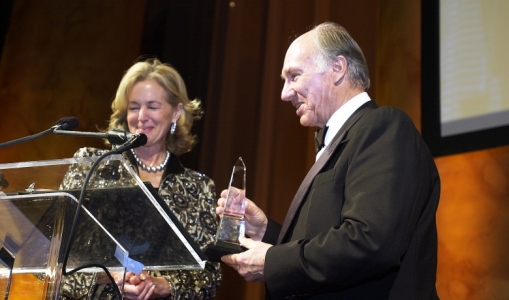Award giver gets his due - AWARD GIVER GETS HIS DUE - 2005-01-22
Royalty has a knack for putting architecture in the spotlight. Denmark's Queen Margrethe II is known for bestowing a triennial prize, underwritten by the Carlsberg brewery, on leading architects from Europe and Japan. In Britain, Prince Charles is famous for criticizing modern buildings and starting an architecture school dedicated to neo-traditional design.
Even more influential in the world of architecture is Prince Karim Aga Khan. A direct descendant of the prophet Muhammad, the 68-year-old multimillionaire is the 49th hereditary imam, or spiritual leader, of Shia Ismaili Muslims around the globe. He directs a Geneva-based network of private foundations dedicated to improving living conditions and expanding opportunities in the Islamic world.
Creating architecture that benefits Muslims is high on his agenda. Presented every three years, the Aga Khan Award for Architecture focuses attention on new structures and renovations all over the globe that uphold and preserve Islamic culture. To win, architects don't have to be Muslim, and their designs can be built in the West so long as they are used by Muslim communities.
Past awards have honored French architect Jean Nouvel's Arab Institute in Paris; the tented hajj airport terminal in Jidda, Saudi Arabia, by New York-based Skidmore, Owings and Merrill; and the National Assembly building in Dhaka, Bangladesh, by the late Philadelphia architect Louis Kahn. Now the Aga Khan is receiving an award of his own.
The National Building Museum is recognizing his efforts with this year's Vincent Scully Prize, named after the distinguished Yale University architectural history professor. The $25,000 prize will be awarded at a black-tie dinner Tuesday. According to the museum, the Aga Khan will donate his winnings to charity.
Chase Rynd, the museum's executive director, says the decision to honor the spiritual leader is 'timely' but not based on political reasons. 'This is a wonderful moment for this institution to help educate the public about the Muslim world,' he says. 'The Aga Khan's interest in architecture is clearly more than a passion. It's a career.' The Muslim leader's involvement in architecture began with concern over modern buildings insensitive to local culture. 'Islamic architecture seemed to have lost its identity ... and its inspiration,' the Aga Khan said in a speech to last year's Khan Award winners. 'Occasionally, construction tended to repeat previous Islamic styles, but much more often, it simply absorbed imported architectural forms, language and materials.'
In 1977, he established his awards program to recognize architecture that imitated neither Western design nor Islam's past but instead offered a fresh interpretation of Muslim traditions. Unlike Prince Charles, the Aga Kahn sees boldly inventive architecture as a positive force in society. It can both symbolize the aspirations of Muslims in the developing world and foster appreciation of Islamic culture in the West.
In contrast to the Hyatt Foundation's Pritzker Prize, touted as architecture's Nobel, the Aga Khan Awards single out the achievements of projects, not an individual's career. The value of the Khan prize
- 3017 reads
 Ismaili.NET - Heritage F.I.E.L.D.
Ismaili.NET - Heritage F.I.E.L.D.